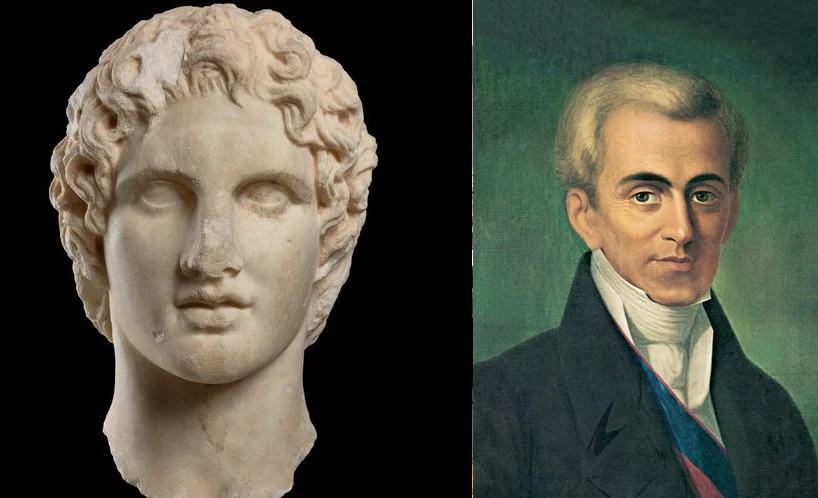
The efforts of Alexander the Great and the first President of modern GREECE Ioannis Kapodistrias to employ Hellenic civilization for the good of humanity reflect the greatness of ancient GREECE/ Hellas.
By Evaggelos Vallianatos
Alexander accomplished so much so soon and so young that he rightly earned the honor of greatness. He was a hero and a genius. His mother Olympias tried to convince him he was the son of zeyus. Alexander loved and trusted his mother. He probably assured himself he was the son of Zeus. His hero, Achilles, was the son of the goddess Thetis.
But the young man loved Aristotle who tutored him in Homer, Greek history, politics, philosophy, and international affairs. In addition, Aristotle passed on to his pupil the enormous knowledge and respect he had for Homer, the teacher of the Greeks for millennia. He edited the Iliad of Homer for Alexander. He urged him to unite the Greeks and to eliminate the Persian danger. Alexander did both.
Alexander was inspired by Aristotle. The result was unprecedented in history. His general Ptolemaios / Ptolemy, who was also a student of Aristotle, became king of Egypt and materialized the dream of Aristotle. He built a Mouseion-university and a library in Alexandria. He opened the doors of these institutes for advanced studies to the best Greek minds. The enlightenment that emerged in Alexandria was astonishing. It made our world. Alexandria became the capital polis of civilization for several centuries in the Mediterranean. And that really was the legacy of Homer, Aristotle, and Alexander.
The other dream of Alexander was to create a united ecumene, in effect a world society and government under the rule of reason. This interpretation of Alexander comes from a Greek living in the Roman Empire that had abolished Greek freedom, conquering Greece in 146 BC and making it a province of Rome. PLUTRCH was that voice. He was a Greek philosopher, prolific writer, and a priest of Apollo. He lived from about the second half of the first century to the first twenty of so years of the second century of our times. He served Rome but remained Greek.
Plutarch said that Plato, Aristotle, and other thinkers like the Stoic Zeno wrote and taught how to live in ideal cities but never translated their ideas into political reality. Alexander did.
He conquered Asia, but his purpose was more than warfare. He dressed like the Asians did. He tried convincing his officers to marry Persian women. He married a princess from Afghanistan. He also established dozens of Greek cities in Asia, all of them governed by justice and the rule of law, thus eliminating injustice in large regions of his empire. Plutarch argues correctly that the conquest of Alexander brought peace, justice, and civilization to Asia.
“[Without Alexander,] Says Plutarch, “Egypt would not have Alexandria, Mesopotamia would be without Seleucia, Sogdiana would not have Prophthasia, India would be without Bucephalia, and the Caucasus would be without Alexandria in the Caucasus. It was by living as citizens of these cities that the bad and unacceptable were extinguished. The lives of the citizens improved by familiarity with better ways of living.
Philosophers pride themselves in refining the brutal and boorish aspects of human nature. Alexander did what philosophers say they do. He succeeded in reforming the bestial nature of countless nations. He certainly is a great philosopher…. Alexander believed that the gods sent him to unite the world and create one commonwealth of equality and justice and civilization.”
Alexander was a revolutionary. In trying to reform his empire and add non-Greeks to Greek culture, he faced resistance from his Greek officers and the local elites in
Asia. After all, for the first time in history a conqueror abandoned violence as a governing principle. Alexander wanted to convince the vast majority of the conquered people he was their friend. He joined Europe and Asia by marriages, similar clothing, and the equal administration of justice and by founding Greek cities all over Asia so Asians could see the difference.
After Alexander the Great
Unfortunately, Alexander died young. He was barely 33 years old when he died in Babylon in 322 BC. Alexander and his successors ignored the rising power of Rome. This turned out to be a fatal error. Romans learned from the Greeks. However, the wars among Alexander’s successors weakened them and gave the Romans a free hand in the West. They dismembered Macedonia and Greece and, by the end of the first century BC, the main kingdoms of Alexander in Asia and Egypt were provinces of Rome.
The Roman Republic became, a vast territory that included Alexander’s empire and Europe. Some of the emperors were responsible leaders, but most of the remaining emperors were ruthless and corrupt.
One of them, Constantine, dumped Greco-Roman religion and culture for a messianic and semitic religion, Christianity. Such a violent policy turned Greco-Roman civilization upside down. The Roman government and the church in the capital of the Eastern Roman Empire, Constantinople, hired northern European barbarians to smash the Greek temples, burn libraries, and otherwise level the magnificent treasures the ancient Greeks had built.
The great Alexandrian Library went up in flames in the late fourth century. In 415, Christian monks tore to pieces Hypatia, director of a philosophy school in Alexandria. Her crime was teaching Platonic and Aristotelian philosophy.
Egypt and Greece belonged to the Eastern Roman Empire. The Western Roman Empire after the fourth century had fallen to the hands of European barbarians. This political division exacerbated divisions within Christianity, which blossomed to a civilization Schism of 1054. The anathemas hurled by the Pope and the Patriarch against each other, and their version of Christianity, brought the crusades against the Moslems and against East and West.
The fourth crusade of 1204, instead of going to Jerusalem to fight the Moslems, it turned its wrath against the Greeks. French, German, and Venetian troops captured Constantinople, thus inflicting a giant wound on the security of medieval Greece. Mongol Turks took notice. They took advantage of the Christian civil war. They kept attacking the Greeks. In 1453, they captured medieval Greece, which also exposed the West to the Mongol Turkish menace.
Greece suffered enormously from the loss of its freedom. Its best scholars left the country for Italy. They were loaded with the surviving manuscripts of ancient Greece. These Greek books were translated into Latin and started the Renaissance and made our world. In 1821, the Greek Revolution brought into being an independent state. In 1828, the European powers, Russia, England, and France, appointed Ioannes Kapodistrias as the first President of Greece.
https://greekreporter.com/2024/04/15/visions-alexander-the-great-ioannis-kapodistrias-hellas









